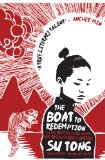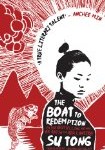
Winner of the Man Asian Literary Prize 2009
Translated from the Chinese by Howard Goldblatt
The Boat to Redemption focuses on the boat people of a Chinese River. The central character is Dongliang, who was once the revered grandson of a revolutionary martyr, but when his ancestry is questioned his life quickly deteriorates.
The main theme of the book is the relationship between Dongliang and his father. It is essentially a coming of age story showing how hard it is to adjust to adulthood, but although it is a very Chinese novel, similar in style to Brothers, the themes of love, heartache and fear are universal.
The book was interesting at the beginning, but the pace was quite slow. It picked up at is progressed and by the half way stage I was captivated – the characters were fascinating and so different from those in Western novels as their superstitions and respect for authority add a different dimension to their problems.
I don’t have a big knowledge of Chinese culture and so I felt that some things went over my head – there were several points where there appeared to be a wise saying, but it didn’t translate well into English. This wasn’t because of a translation problem (I think Howard Goldblatt did a great job) but because there wasn’t an equivalent phrase in English.
‘If your mother finds you, then you’ll be a drowned ghost too, with moss growing all over your body.’
As with many other Chinese novels there was an obsession with genitalia in this book. I found that some of the scenes put me off my food for a few hours, but there was no explicit sex or extreme violence, so most people will cringe rather than be offended.
I’m sure that this book would be even more impressive if read in the Chinese, but even with a limited knowledge of the culture there is still a lot to enjoy.
Recommended to fans of Chinese literature.
![]()

24 replies on “The Boat to Redemption – Su Tong”
I have to say this is a book I have been seeing the image of on your blog a while and thinking ‘ooh I would like to read that’ and now hearing about it I think it sounds great. I am a huge fan of chinese literature and will have to keep my eyes peeled for this at the library at some point.
Simon, I’d love to know your thoughts on this one, as it has a lot more depth than any of the Chinese books I’ve read in the past. I think I need to do a bit more research into their beliefs.
This sounds interesting – I picked up a book by Xinran earlier called Miss Chopsticks which is also chinese and which I’m looking forward to. it’s interesting reading about a different culture.
PS: Sorry I haven’t stopped by recently – Christmas and starting a new job.
Verity, I haven’t read anything by Xinran, but have heard good things in the past. I hope that you enjoy it!
Don’t worry about not stopping by – I have also been a lot worse at visiting blogs recently. Hopefully everything will get back to normal once all this snow has gone!
Miss Chopsticks was a delightful read – not absolutely wonderful (I wondered whether it might have lost something in translation even though it was a very good translation) – but I would definitely recommend it.
Verity, Thanks for letting me know!
This book sounds really great. I’m a fan of Chinese history and will keep and eye out for this one.
Jennifer, I hope that you manage to find a copy somewhere!
A fine review because you describe the positive and negative sides so well. And I don´t think Asians mind that the pace is slow in parts of the story.
Dorte, Thank you for the kind words! I don’t think anyone minds if certain parts of the plot are slow – as long as it is good in the end!
I can’t say I’m terribly obsessed with Chinese literature, but I bet my sister would enjoy it. I’ll have to mention it to her.
Sandy, I hope that your sister likes the sound of it!
Most of the Chinese literature that I have read has been either non-fiction or based on fact (like Miss Chopsticks, which I wasn’t too impressed with, although I’d like to read more Xinran). I do love the insight into Chinese culture including wise sayings, superstitions and traditions that Amy Tan provides. I was unaware of any obsession with genitalia, however!
The Boat to Redemption sound like one worth looking out for.
Claire, I haven’t read that much Chinese literarture. Most of it has been autobiographical or of a lighter nature, written for a Western audience. I love Amy Tan, but this sort of book is a lot deeper. It is this real, Chinese literature, written for the Chinese that is obsessed with genitalia!
I’m obviously reading a different type of Chinese literature! Shanghai Baby by Wei Hui caused a lot of controversy because of its sexual content but I can’t remember if there was a lot of genitalia fixation … but then it’s been almost ten years since I read that and longer for Wild Swans (MUST read more Chinese literature!)
Mm what’s with this obsession with genitalia? It doesn’t ring a bell to me. We probably have been reading different Chinese literature. I’ve been meaning to read Brothers since I read your review. I’m not sure if Su Tong is high on my list, apart from Binu and the Great Wall, which is already sitting on my shelf. Gao Xingjian (Nobel prize winner) is clearer on my radar for a while. But his Soul Mountain book is so thick!–so I keep putting off reading that one.
mee, Perhaps I have just been reading the wrong books and the obsession is just a coincidence?
I couldn’t get into Soul Mountain. I didn’t like the writing in the 1st person. I might try it again one day, as I’m sure it is good. If you think Soul Mountain is thick then you need to avoid Brothers – that is a tome!
The only Chinese-related sort of novels I’ve read are Amy Tan’s novels, which, as you noted, are different from Chinese literature. I keep telling myself I’m going to learn to read Chinese one day …
Belle, Good luck learning Chinese – I imagine it is really hard. If you ever do, perhaps you could read this book and explain it to me!
I dont think I have ever read Japanese literature. This sounds interesting and I am drawn to the cover.
Ok – must be tired.. I meant Chinese literature. 🙂
Sheila, I love Japanese and Chinese literature – in fact I think I prefer Japanese, so don’t worry about it!
[…] This post was mentioned on Twitter by Jackie Bailey, stuart allen. stuart allen said: RT @farmlanebooks: New blog post: The Boat to Redemption by Su Tong http://bit.ly/5eaNEo If you like Chinese literature then you'll love it! […]
[…] 2009 Winner: The Boat to Redemption by Su Tong […]